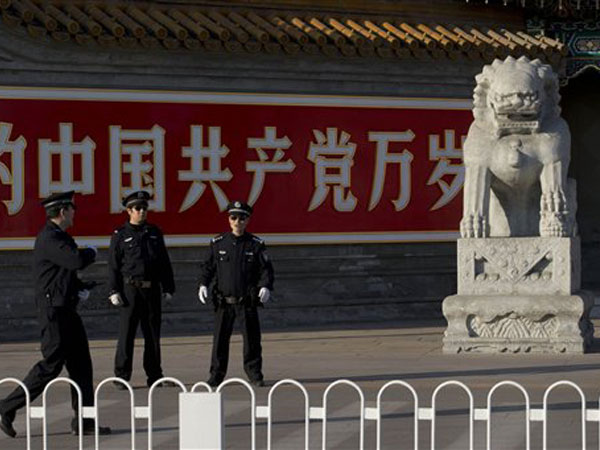Dust of corruption case lingers over China’s Nanjing – Focus

Chinese policemen guard the entrance to the Zhongnanhai leadership compound near the Chinese characters for “Long live the Chinese Communist Party” in Beijing Tuesday, Nov. 12, 2013. AP FILE PHOTO
NANJING, CHINA- When Nanjing’s mayor was removed for corruption, residents set off firecrackers to celebrate the departure of the leader who turned the former imperial capital into a dusty construction site.
Ji Jianye’s fall last month made him one of 11 officials ranked at vice-minister level or above to have been snared by Chinese President Xi Jinping’s much-publicized anti-graft drive.
A four-day meeting of top leaders of the ruling Communist party pledged Tuesday to “improve the system to punish and prevent corruption and build clean politics,” according to a communiqué.
Xi has promised to take on both senior “tigers” and low-level “flies,” and the party’s feared internal discipline body has sent teams of inspectors on field trips.
But analysts and Nanjing residents alike doubt the leadership’s commitment, and wonder whether politics play a role in picking the targets.
Nanjing, a city of eight million, is best known as the site of a 1937 massacre by Japanese soldiers and as China’s former capital, notably during the Ming Dynasty in the 14th century.
Residents called the mayor “Bulldozer Ji” for his penchant for construction projects launched to spur development, a route to promotion for Chinese officials — and an opportunity for kickbacks.
The city’s new assets range from a conference centre to sports facilities for the Youth Olympic Games, but thousands of people protested in 2011 after workers chopped down its stately trees, a variety known as the Chinese parasol, for a metro line.
Ji held the mayoral post for more than three years until authorities decided he had violated the law and Communist Party discipline, a phrase which typically refers to corruption.
But residents say that while all government officials are dirty, only some are punished.
“All officials are corrupt,” said taxi driver Yuan Changjiang as he navigated the city’s congested streets.
“It’s like an eagle standing on the bank of a river catching fish, some get caught, and some don’t.”
The independent anti-graft group Transparency International gave China a score of just 39 in its latest index of perceived corruption — on a scale ranging from 100 down to zero — on a par with Serbia and Trinidad, and behind Ghana and Saudi Arabia.
Former Politburo member Bo Xilai was jailed for life in September at the end of a long-running scandal, but analysts wonder how committed China’s leader is to pursuing corruption at the very highest levels of government.
“He has not been able to go after so-called big tigers,” said Willy Lam, professor at the Chinese University of Hong Kong.
In Nanjing, taxi driver Yuan believes the former mayor — previously the party chief of Yangzhou, the home town of Jiang Zemin, China’s president from 1993 to 2003 — fell because of politics.
“He belonged to Jiang Zemin. They’re doing in Jiang’s bunch,” he said.
Nanjing residents cite the Jiang link widely, as have overseas Chinese media, also speculating that the mayor’s removal was in part due to the new administration wanting its own people in key positions.
Jiang is identified as head of the “Shanghai Clique” of officials with links to the commercial city, and is believed to still wield political influence despite relinquishing his official posts.
Chinese media have vilified Ji, usual practice after a leader’s downfall, calling him a corrupt official, plagiarist and philanderer.
In Yangzhou he selected a “fair-skinned” mistress from the government secretarial pool, reports said.
Earlier, during his time as mayor and party secretary of Kunshan, which has boomed with investment from Taiwan, he allegedly built ties with a company he later gave construction projects to in exchange for bribes, according to state media.
Reports said he reaped ill-gotten gains of $3.3 million from graft.
Ji spent his entire career in his home province of Jiangsu, and the case leaves lingering questions over his steady climb up the political ladder.
“In spite of all the rumors about his misdeeds, he was promoted all the way to the provincial capital (Nanjing)… But he was not investigated,” the China Daily said in a rare critical editorial.
“The official appointment mechanisms have to be adjusted,” it said.
The official Xinhua news agency also criticised Ji over construction projects, calling it the “Big Dig” phenomenon.
China’s new leaders aim to shift away from government-funded infrastructure projects as a key driver of economic growth to a more sustainable form of development.
But the ruling party has failed to set up institutional restraints against corruption, such as a more independent judiciary and free media.
“Ji was just unlucky,” said another Nanjing resident. “If you ‘kill’ one corrupt official, another one will come.”














